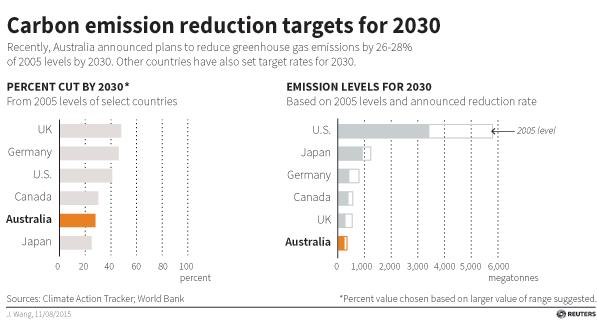How well is Australia fighting climate change?


Get involved with our crowdsourced digital platform to deliver impact at scale
Stay up to date:
Energy Transition
The climate change conversation is heating up in the prelude to the 2015 United Nations Climate Change Conference in Paris. Australian Prime Minister Tony Abbott recently announced that his country would reduce carbon emissions by 26-28% by the year 2030. He was then forced to defend his country’s environmental policies when conservationists argued that this reduction was insufficient.
So how does Australia’s promised reduction in carbon emissions compare with commitments made by other countries?
These commitments are part of Australia’s intended nationally determined contributions (INDCs), which are the concrete climate actions that all countries are expected to submit ahead of the climate conference. Australia is the 25th country to submit an INDC.
The goal of the conference is to create a legally binding and universal agreement on climate change that will see a reduction in greenhouse gas emissions, ensuring average global temperature increases stay below 2%.
Source: World Resources Institute
To view an interactive map of all submitted INDCs, visit the World Resources Institute’s Paris Contributions Map.
Have you seen?
How wave energy can power Australia
2015: the year of global action on climate change
How can Australia generate double the energy?
Author: Murray Nicol is a Digital Project Manager at the World Economic Forum.
Image: Sheep graze in front of wind turbines that are part of the Infigen Energy’s Capital Windfarm located on the hills surrounding Lake George, near the Australian capital city of Canberra, Australia, July 17, 2015. REUTERS/David Gray
Don't miss any update on this topic
Create a free account and access your personalized content collection with our latest publications and analyses.
License and Republishing
World Economic Forum articles may be republished in accordance with the Creative Commons Attribution-NonCommercial-NoDerivatives 4.0 International Public License, and in accordance with our Terms of Use.
The views expressed in this article are those of the author alone and not the World Economic Forum.
Related topics:
The Agenda Weekly
A weekly update of the most important issues driving the global agenda
You can unsubscribe at any time using the link in our emails. For more details, review our privacy policy.
More on Energy TransitionSee all
Katie Fedosenko and Luciana Gutmann
April 15, 2024
Johnny Wood
April 11, 2024
Alexandre Raffoul and Kai Keller
April 10, 2024
Roberto Bocca
April 10, 2024
Naoko Tochibayashi and Naoko Kutty
April 10, 2024
Linda Lacina
April 5, 2024








